![]()
The Words The Kwak Family
|
|
The Words The Kwak Family |
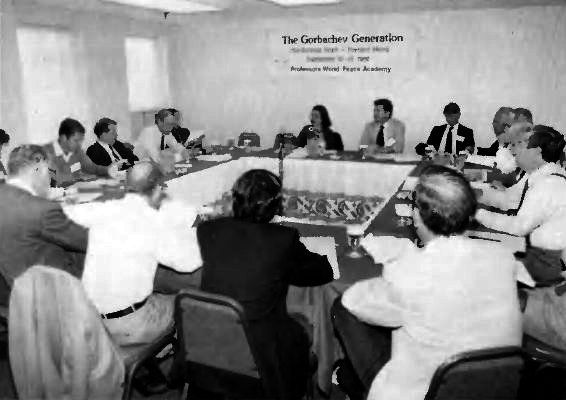
Participants
at the PWPA conference entitled "The Gorbachev Generation,"
held September 12-15 in Portland, Maine.
The Professors World Peace Academy (PWPA) made its humble beginning in 1973 with a series of friendship talks between Japan and Korea. Since then it has expanded into a major international organization with chapters in over 90 countries. It's essential aim is to promote peace by establishing a network among scholars for the dissemination of ideas that can provide solutions to world problems.
This year PWPA has scheduled 38 major conferences in 31 nations. A list of these conferences has been provided to show their impressive timeliness and breadth. Short reports on five conferences are outlined below.
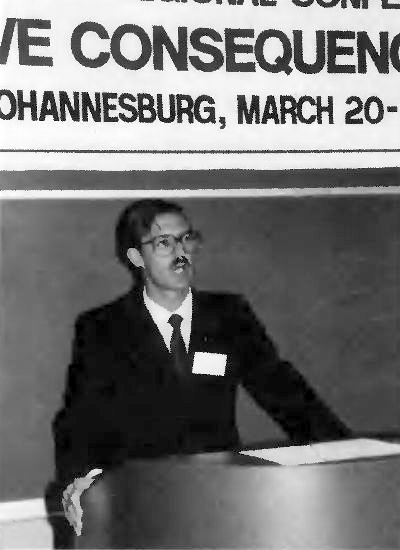
Professor
Francois Venter delivers a paper on "Law as a Vehicle for Peace
in South Africa," at the PWPA conference entitled "Ideas
Have Consequences," held March 20-23 in Johannesburg, South
Africa.
On March 20, thirty scholars from both inside and outside South Africa assembled for a rare dialogue on the critical issue of apartheid. The conference was entitled Ideas Have Consequences. Among the participants were Afrikaners, Englishmen, blacks, and Indians of conservative, liberal, and radical persuasions. Although the discussions became quite heated at times, the tone was mostly quite courteous -- a remarkable accomplishment in itself.
In a statement issued on September 18, 1984, Rev. C. H. Kwak, chairman of PWPA's Board of Directors, said,
By its very nature, apartheid is a teaching and practice which works against the interests of peace.... The manipulation of resentment of black Africans for the purpose of dividing and conquering is...condemned, as it is not in the interests of the unification of Africa.... The PWPA conferences should serve as a catalyst to break down barriers....
This South African PWPA conference was an effort to fulfill this mandate and bring about nonviolent solutions.
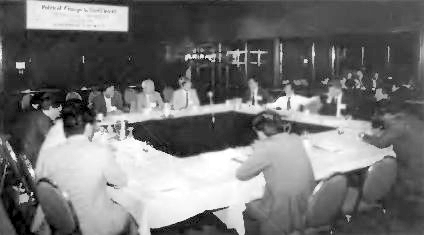
Participants
at the PWPA conference entitled "Political Change in South
Korea;' held on August 28 in Washington DC.
On March 23, twenty-five Japanese scholars and leaders met for a luncheon forum at the Chicago Hilton Towers Hotel. The topic of the meeting, The Future of US-Japan Relations, occasioned some interesting and farsighted comments by Dr. Morton Kaplan, president of PWPA International, in his keynote address:
During my first trip to Japan in 1959, I gave a talk at the International House to a group of newspaper and magazine editors. I argued that Japan was rapidly becoming a world power and would have to face up to its responsibilities. The Japanese then did not see themselves becoming a world power. Now I think there is no doubt in their minds that they are, but clearly they have not accepted all the responsibilities entailed.
What about relations between the US and Japan? I think one of the issues is...Central America.... Anyone who has read the captured documents from Grenada cannot doubt that the leaders of the present government in Nicaragua are Leninists, that it is their intention...to impose a strong Leninist regime, [and] to dispense revolutionary activity throughout the area. This is in fact central to the American relationship to the world for several reasons. One reason is our sea routes through the Caribbean to [Eur-Asia]....
There is a second reason.... We have south of the US an extremely vulnerable area. One might wonder why there has not been a revolution [in Mexico] yet. With the poor economic conditions in Mexico, [there is] still a flood of illegal immigrants. Now if these things happen, the US will be distracted from the rest of the world.... This means we will not be doing things that politically or economically make sense in terms of the international system.
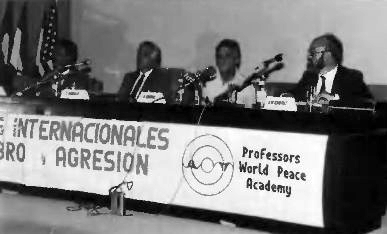
Panelists
at the conference entitled "Psychobiology for Peace;' held May
12-13 in Seville, Spain.
Dr. Kaplan then exhorted participants, as representatives of the Japanese people, to join with the United States in strengthening democratic values and institutions throughout the world.
On April 3-6, PWPA Britain held its annual conference in St. Helen, Jersey, on the topic Religion, State, and Society in Modern Britain. The organizing chairman and editor of the proposed book from the conference, Rev. Dr. Paul Badham, chairman of church history at St. David's University College, University of Wales, Lampeter, chose to approach the religion-state question from the viewpoint of all major faiths now active in Britain -- including its indigenous folk religions, which are still very much alive! Besides the 13 papers which were presented at the conference, a number of others were also commissioned for the book in order to provide the most comprehensive discussion of the subject yet available.
The conference papers covered such diverse religious themes as political involvement, secularization, pluralism, the role of women, the problem of nuclear weapons, the troubles in Northern Ireland, and new religious movements. Many participants commented on the harmony and productivity of this conference.
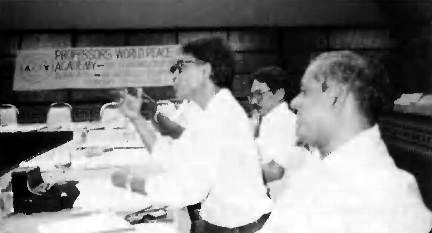
Lively
discussion at the conference entitled "Economic Development in
Malaysia;' held February 23-26 in Phuket, Thailand.
The 16th International Conference on World Peace was held in Seoul, Korea, from July 15-18, under the theme of The New Discovery of Asia. In their papers the professors addressed the key problem of how the Western values of rationalism and individual enterprise and the Oriental values of filial piety and loyalty can be harmonized to bring about a prosperous Asia in the 21st century.
One of the most important PWPA events of 1986 was the conference on The Aquino Phenomenon II: A Study of Peaceful Change, held August 8-9 in Manila. Cultural, philosophical, economic, and spiritual aspects of the rise of President Aquino were discussed. One of the speakers was Mr. Pedro J. Chamorro from Managua, Nicaragua, the former editor of La Prensa, who spoke on "Censorship and Revolution: Maintaining Democratic Institutions in a Revolutionary Society' Rev. C. H. Kwak gave the welcoming address and spoke of the Aquino revolution as an attempt to break from the pattern of violent revolution so prevalent in the world today. "I want to assure you," he said to the Filipino scholars, "that if you stand firm in your resolve to bring about a genuine revolution of goodness, you will become a symbol of hope for many peoples."